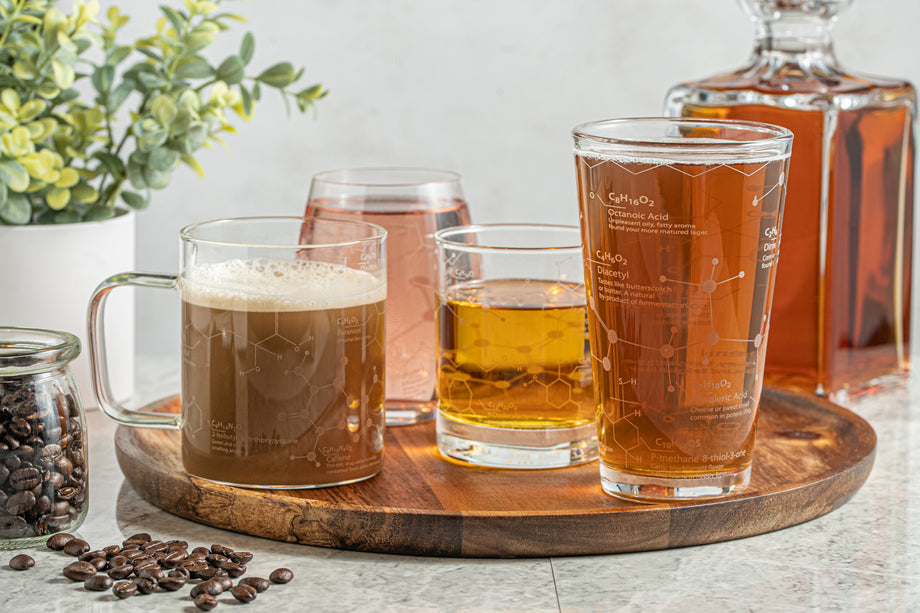How Does Chemistry Affect the Outcome of Coffee?

Not many people can resist the enticing aroma of a freshly brewed cup of Joe. The taste strikes the perfect balance between pleasant bitterness and smoothness, while the caffeine gives us that much-needed morning boost.
It's easy to see why practically the whole world is obsessed with coffee, but have you ever wondered why – or how – it's so good? There's more to a cup of coffee that meets the eye or even the tastebuds. Most of it has to do with the chemistry that affects the flavor.
Many factors enhance our favorite drink. Here's how chemistry affects the outcome of coffee.
It Starts with the Aroma
Smell plays a significant role in the coffee experience. When you have a blocked nose, it is tough to taste anything properly, and it's the same for coffee. If you cannot smell the coffee's aroma as you drink your cup, it will taste too bitter or sour.
Volatile compounds give coffee its signature scent. We can describe a volatile compound as a chemical with a high vapor pressure at room temperature. In coffee, these include caffeine, antioxidants, and diterpenes, but there are no fewer than 800 different volatile compounds in a single bean! Roasting releases these compounds, creating the aroma.
The Effect of the Roast
Green coffee beans contain many different acids, such as quinic, citric, malic, and chlorogenic acids. They have a sour, tart flavor that changes when coffee is roasted.
You may have heard of the Maillard reaction, which occurs when foodstuffs are heated or cooked. The acids and the sugars in the food react with each other and produce specific flavors and smells.
When coffee beans are heated or roasted, the Maillard reaction takes place and breaks down the acids in the beans to create the wonderful flavor of the coffee. The length of the roast is essential because the darker you make it, the more bitter the coffee will be. A lighter roast will be sweeter and smoother.
By isolating certain volatile compounds, chemists can influence specific aromatic notes to enhance the taste of coffee. Similarly, it is possible for them to adapt the roast to achieve the desired coffee flavor. In this case, this scientific wizardry would take place long before you've bought the bag of coffee, but some of your actions and choices will also affect the taste.
The Quality of Your Water
The type and quality of your water can make a massive difference to your morning cup of coffee. The water is essential for extracting the right balance of sugars, acids, bases, and starches from the ground beans. How well the water does this will influence the flavor.
Hard water or water with salt elements is not generally recommended for brewing coffee. However, it isn't easy to identify a single type of water that consistently produces excellent results. Filtering water before brewing coffee is an excellent way to ensure quality and consistency. Those seeking the perfect cup can play around with filtration methods and enjoy the different results.
Brewing Temperature and Time
The hotter the water, the higher the extraction rates. You'll get a far deeper, richer flavor from hot brewed coffee than you will from cold brewed. However, heat also enhances the bitter notes of coffee and increases the amount of caffeine extracted. For a smoother, less caffeinated cup, you could try brewing it with lower water temperatures. Very high temperatures will destroy much of the coffee's flavor, but it will leave the caffeine intact.
Brewing time also affects flavor, bitterness, and caffeine levels. A short-brewed coffee will result in a flat-tasting but highly caffeinated cup. A long-brewed coffee is more likely to end up bitter.
So which temperature and brewing time is best? There's no clear answer. It all depends on the chemical make-up of the beans you use. However, you can produce the ultimate cup of coffee by playing with the different variables until you strike the perfect balance.
The Right Ratio
Finally - and arguably most importantly – you'll need to consider the ratio of coffee to water. Too much water leads to a dull drink. Too little water generates strength that may blow your head off. The golden ratio ultimately depends on what you want from your coffee. This, combined with the other variables, will affect the outcome of your coffee.
The science and chemistry behind coffee are as complex as the flavor. As baffling as it can be, we're not going to stop drinking coffee anytime soon. One easy way to enhance your morning brew is by leveling up your drink ware.
|
This awesome pair of "Science of Coffee" 16oz glass mugs will make any coffee lover happy. This high-quality drink ware set, designed for any science or coffee enthusiast, will ensure that your day starts off on the right foot. Plus, it’s a great reminder of the chemistry experiment you perform every morning and the wonder of science that exists in every cup. |
 |